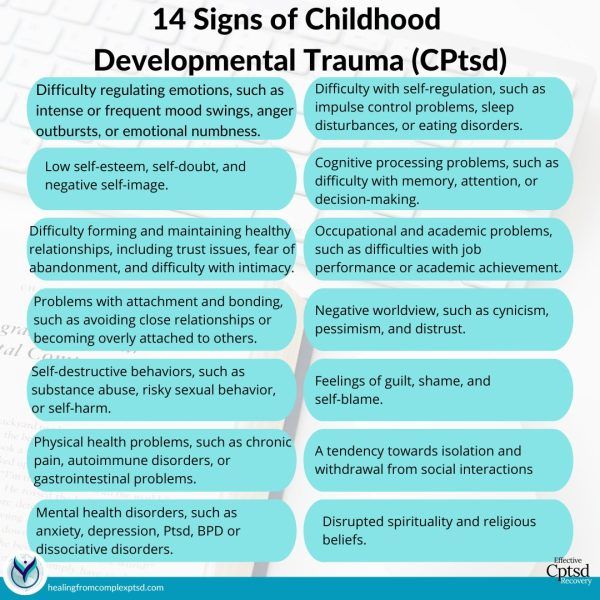1) Childhood trauma is an experience that can have lasting effects on a person's life. It can manifest in many ways and can impact a person's emotional, physical, and psychological well-being, often in complex ways that can be difficult to recognize or understand. Here, we'll explore 14 potential impacts of childhood trauma on development and how they can impact life as an adult.
2) Difficulty regulating emotions: Childhood trauma can lead to difficulties regulating emotions, such as intense or frequent mood swings, anger outbursts, or emotional numbness. This can lead to difficulty in expressing oneself appropriately, and in maintaining healthy relationships, as others may find it challenging to deal with the person's intense emotions.
3) Low self-esteem: Childhood trauma can cause low self-esteem, self-doubt, and negative self-image. This can result in a lack of confidence in oneself, leading to a decrease in personal achievement and overall life satisfaction.
4) Difficulty forming and maintaining healthy relationships: Childhood trauma can cause a person to have problems with forming and maintaining healthy relationships, including trust issues, fear of abandonment, and difficulty with intimacy. This can lead to loneliness, isolation, and an overall decrease in quality of life.
5) Problems with attachment and bonding: Childhood trauma can result in difficulties with attachment and bonding, such as avoiding close relationships or becoming overly attached to others. This can lead to a sense of confusion and mistrust in personal relationships, which can further contribute to feelings of isolation and loneliness.
6) Self-destructive behaviours: Childhood trauma can lead to self-destructive behaviors such as substance abuse, risky sexual behavior, or self-harm. These behaviors can result in both physical and mental health issues, leading to a further decrease in overall quality of life.Physical health problems: Childhood trauma can lead to physical health problems such as chronic pain, autoimmune disorders, or gastrointestinal problems. These issues can be chronic and debilitating, leading to a decrease in overall health and wellbeing.
7) Mental health disorders: Childhood trauma can lead to mental health disorders such as anxiety, depression, post-traumatic stress disorder (PTSD), borderline personality disorder, or dissociative disorders. These disorders can make it difficult to function in daily life, leading to a decrease in overall quality of life.
2) Difficulty regulating emotions: Childhood trauma can lead to difficulties regulating emotions, such as intense or frequent mood swings, anger outbursts, or emotional numbness. This can lead to difficulty in expressing oneself appropriately, and in maintaining healthy relationships, as others may find it challenging to deal with the person's intense emotions.
3) Low self-esteem: Childhood trauma can cause low self-esteem, self-doubt, and negative self-image. This can result in a lack of confidence in oneself, leading to a decrease in personal achievement and overall life satisfaction.
4) Difficulty forming and maintaining healthy relationships: Childhood trauma can cause a person to have problems with forming and maintaining healthy relationships, including trust issues, fear of abandonment, and difficulty with intimacy. This can lead to loneliness, isolation, and an overall decrease in quality of life.
5) Problems with attachment and bonding: Childhood trauma can result in difficulties with attachment and bonding, such as avoiding close relationships or becoming overly attached to others. This can lead to a sense of confusion and mistrust in personal relationships, which can further contribute to feelings of isolation and loneliness.
6) Self-destructive behaviours: Childhood trauma can lead to self-destructive behaviors such as substance abuse, risky sexual behavior, or self-harm. These behaviors can result in both physical and mental health issues, leading to a further decrease in overall quality of life.Physical health problems: Childhood trauma can lead to physical health problems such as chronic pain, autoimmune disorders, or gastrointestinal problems. These issues can be chronic and debilitating, leading to a decrease in overall health and wellbeing.
7) Mental health disorders: Childhood trauma can lead to mental health disorders such as anxiety, depression, post-traumatic stress disorder (PTSD), borderline personality disorder, or dissociative disorders. These disorders can make it difficult to function in daily life, leading to a decrease in overall quality of life.


Effective. | Trauma. | Recovery. | Found Here.
Learn more about complex trauma recovery coaching with Linda. For those taking a proactive approach to recovery and needing answers to help heal their whole self.

